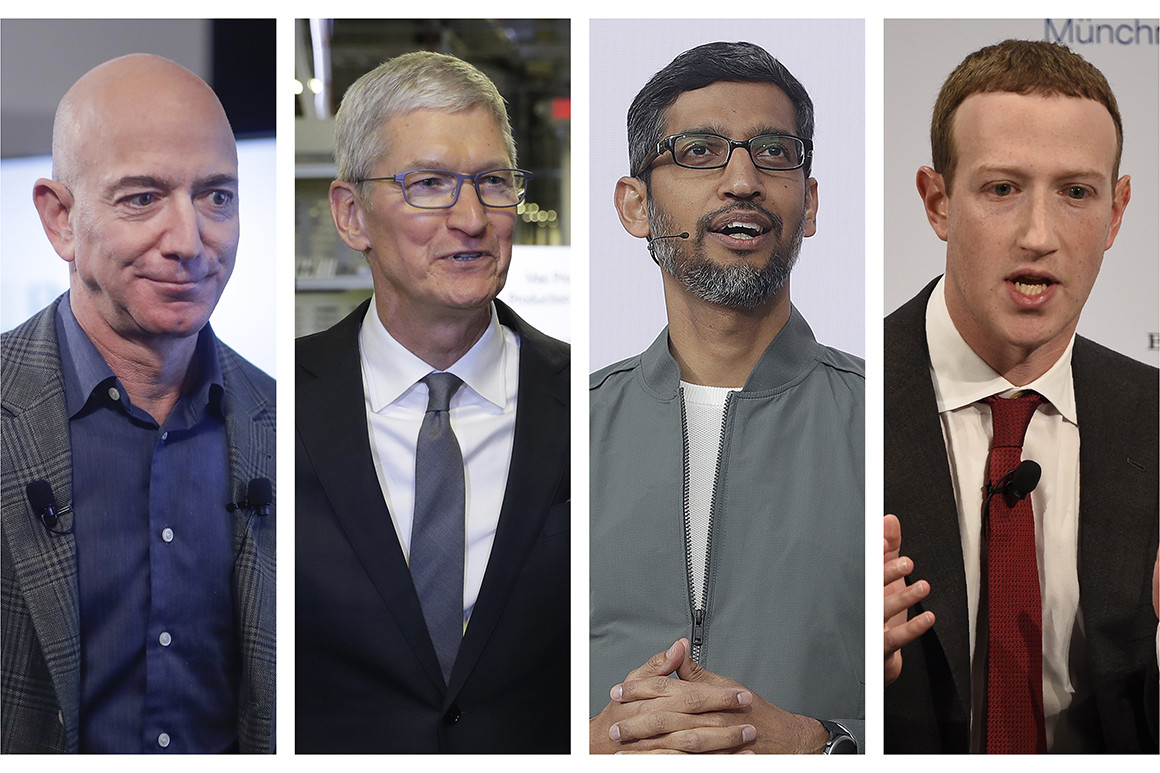
Credit: AP Photo/Pablo Martinez Monsivais, Evan Vucci, Jeff Chiu, Jens Meyer
Wednesday, July 29th, the 4 companies that make up Big Tech, Amazon, Apple, Google and Facebook faced off with Congress on allegations that their business's monopolistic practices stifle competition unfairly, breaking antitrust laws.
Facebook’s Mark Zuckerberg, Amazon’s Jeff Bezos, Google’s Sundar Pichai, and Apple’s Tim Cook testified (remotely) on the anti-competitive behavior of their companies.
The House Judiciary Committee began this investigation over a year ago and collected over 1.3 million documents about these business practices.
This marks the 1st time that Amazon CEO Jeff Bezos, whose net worth is 181 BILLION dollars, has ever faced Congress.
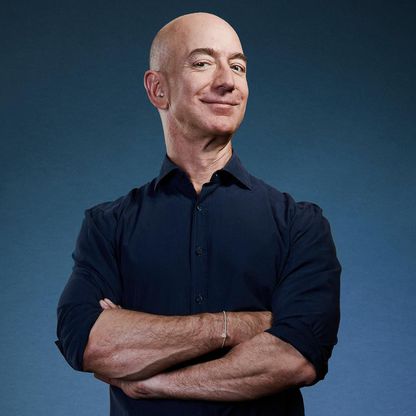
PHOTO BY MICHAEL PRINCE/FORBES COLLECTION
Big Tech CEOs appeared virtually before Congress for 5 hours facing relentless criticism of their business practices. Amazon's CEO Jeff Bezos' opening statement was:
“Just like the world needs small companies, it also needs large ones,”
The Committee Chairman Rep. David Cicilline likened the CEOs to kings and said Congress wasn’t going to bow down to them.

Graeme Jennings | Credit: AP
‘Your ability to dictate terms, call the shots, upend entire sectors, inspire FEAR resemble the powers of a private government. Our founders would not bow before a king, nor should we bow before the emperors of the online economy.”
Then the lawmakers cited details on the executives emails and internal documents they’d acquired, and pressuring Big Tech CEOs to explain how they got their market dollars.
Amazon’s antitrust investigation was considered less in depth as questions asked of Google and Facebook but there were some pointed questions asked.
These included how Amazon treats and handles 3rd party sellers on its website to whether or not the company properly regulates knock offs and counterfeit products.
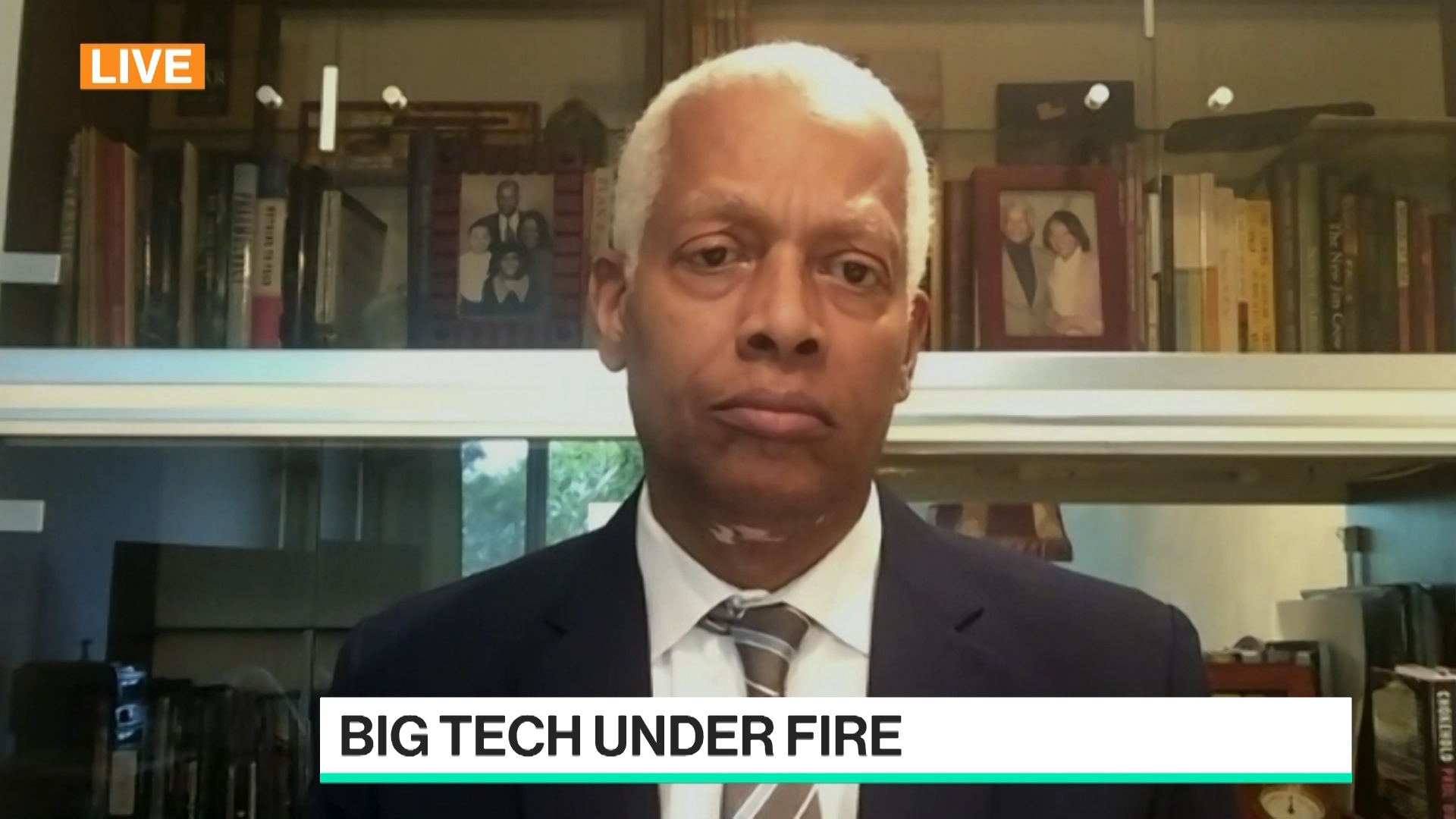
Credit: Bloomberg
Rep. Hank Johnson asked:
“Why isn’t Amazon responsible for keeping all counterfeit products off of its platform?”
Jeff Bezos replied:
“We do a lot to prevent counterfeiting. We have uh, a team of more than a thousand people that does this.”
Lawmakers cited a Wall Street Journal report from April this year that stated Amazon.com Inc. employees have used data about independent sellers on Amazon to develop competing products, at odds with their own stated policies.
Rep. Pramila Jayapal asked:
“Does Amazon ever access and use 3rd party seller data when making business decisions? And a yes or no will suffice sir.”
Amazon CEO Bezos replied:
“I can’t answer that question ‘yes’ or ‘no’ what I can tell you is we have a policy against using seller-specific data to aid our private label business but I can’t guarantee you that that policy hasn’t been violated.”
Which essentially means, yes, Amazon has data mined independent sellers’ data to compete against them but, will assign blame later to a scape goat. Maybe a few contract employees will get fired.
When your company gets big, it's good to remember why we do this, so humanity doesn't get lost just crunching numbers.
What do consumers in America actually feel about Big Tech’s dominance of the market?
72% of U.S. adults believe big tech companies have too much “power and influence” in politics, per a Pew Research survey conducted in June, while an Accountable Tech/GQR Research poll in July found 85% of respondents believe they have too much power in general. [Source: Forbes]
Google was playing for higher stakes because of how advanced the anti trust investigation is against them. The other 3 companies aren’t facing as serious of a monopoly charge as Google is facing.
It’s highly likely there will be a new law suit filed against Google in the coming months.
Congress asked questions relevant to their ongoing investigation against Google. One of which was how often does Google tailor search results to keep people on Google instead objective data, and info other websites provide?
Committee chairman Rep. David Cicilline asked:
“Did Google ever use its surveillance over web traffic to identify competitive threats?”
Google CEO Sundar Pichai responded:
“Congressman, just like other businesses, we try to understand trends from uh you know data we can see.We use it to improve products for our users,”
Almost the entire rest of Google’s time at the hearing was defending itself against charges that its search results don’t favor republicans.
Apple’s CEO Tim Cook didn’t get as many questions.
Most of the questions Apple got related to the App Store, and whether when a consumer is searching for apps if the search results favor apps Apple engineers over competitor apps.
Rep. Hank Johnson asked:
“Does Apple not treat all app developers equally?”
Cook replied,
“Sir we treat every developer the same. We have open uhhhh and transparent rules. It’s a rigorous process. Because we care so deeply about privacy, security and quality, we do look at every app before it goes on…”
Cook said that Apple acts fairly, pointing to the diversity of apps on the app store, as well as the benefits to consumers in having a wide selection instead of just Apple-made apps.
Facebook’s CEO Zuckerberg got many questions on misinformation and perceived political bias on the many social media companies they own.
Zuck replied:
“We do not want to become the arbiters of truth. I think that would be a bad position for us to be in.”
Speaking to the charges of monopolizing social media sectors, there were questions about social media companies Facebook has bought such as Instagram.
Ant-trust investigations into this exposed internal Facebook emails Mark Zuckerberg sent around the time of these acquisitions.
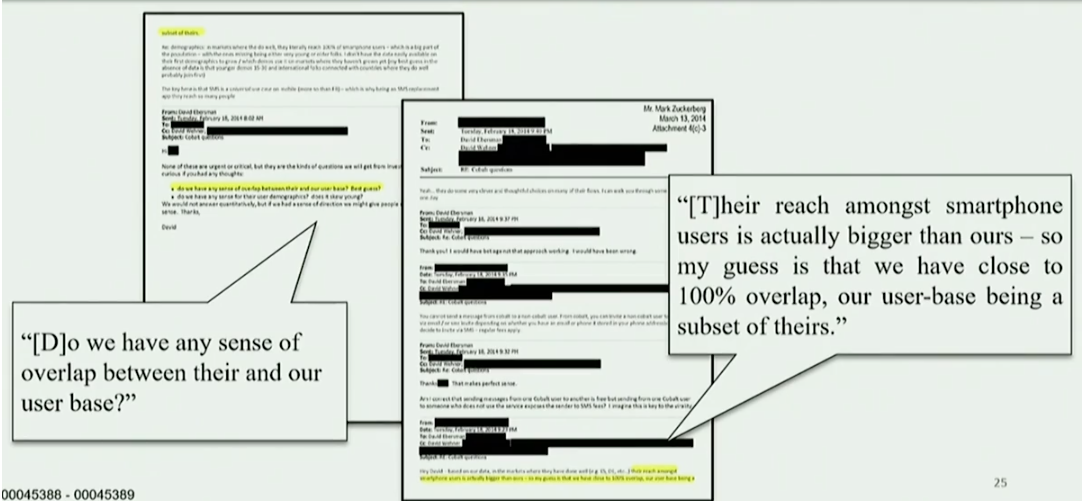
Rep. Joe Neguse said:
“Facebook also tried to buy other competitive startups…in fact you did tell one of Facebook’s senior engineers in 2012 that you can quote:
‘Likely just buy any competitive startup but it will be a while before we can buy Google.’
Do you recall writing that email?”
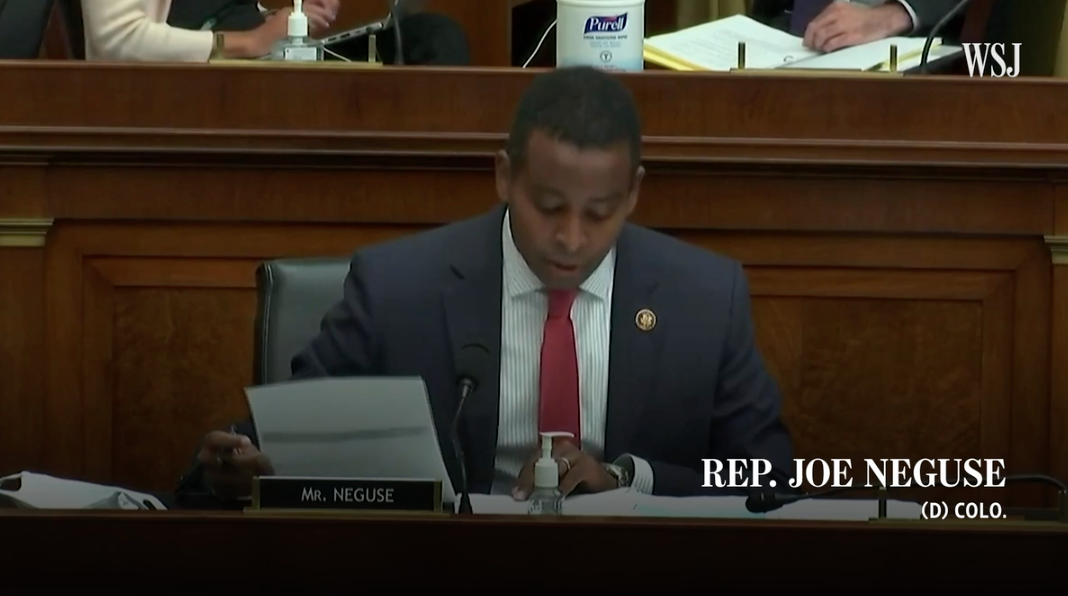
Facebook CEO Zuckerberg replied:
“Uh Congressman, I don’t specifically but it sounds like a joke.”

Zuckerberg pointed out that his acquisition of Instagram was approved at the time by regulators.
A key takeaway is that Congress did their research this time to actually understand more of how these Big Tech companies work and had better questions.
Top down view shows that these companies will continue to be under the microscope from both sides of the aisle.
The House antitrust subcommittee is going to release a report in the aftermath of this hearing with recommendations on changes to antitrust laws - in regards to Big Tech’s monopoly.
Federal Trade Commission investigations in the states are going to use some of the information revealed in this hearing to further their cases.
What's concerning is that if Google is filtering results from your Google searches to reveal less than the truth - this manipulates your perception of reality.
If Google search results only cater to their advertisers and things that support their platform - this is literally creating life choices for billions of people who view the same data as objective.
It wouldn't be an issue if there was a real space for other search engines to compete, but Bing is dead, Duck Duck Go is used by only a small minority and Yahoo search is a joke.
With Google being used by everybody...this is where being a monopoly causes issues:
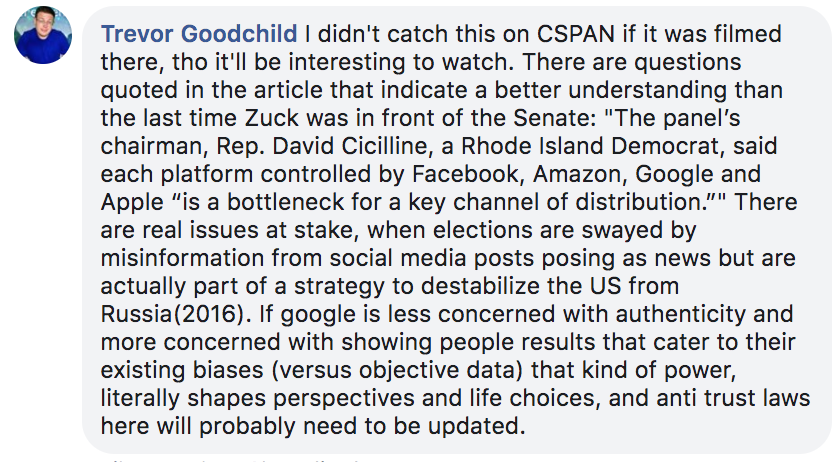
How do you think antitrust laws should change in regards to Big Tech?
. . .
Enjoyed this blog?
Signup here to get updates on new startup blogs.
Is Facebook not explaining why the disapproved an ad?
I worked at FB for years and offer FB Policy Consulting here
Available for freelance writing and guest posting on your blog: [email protected]
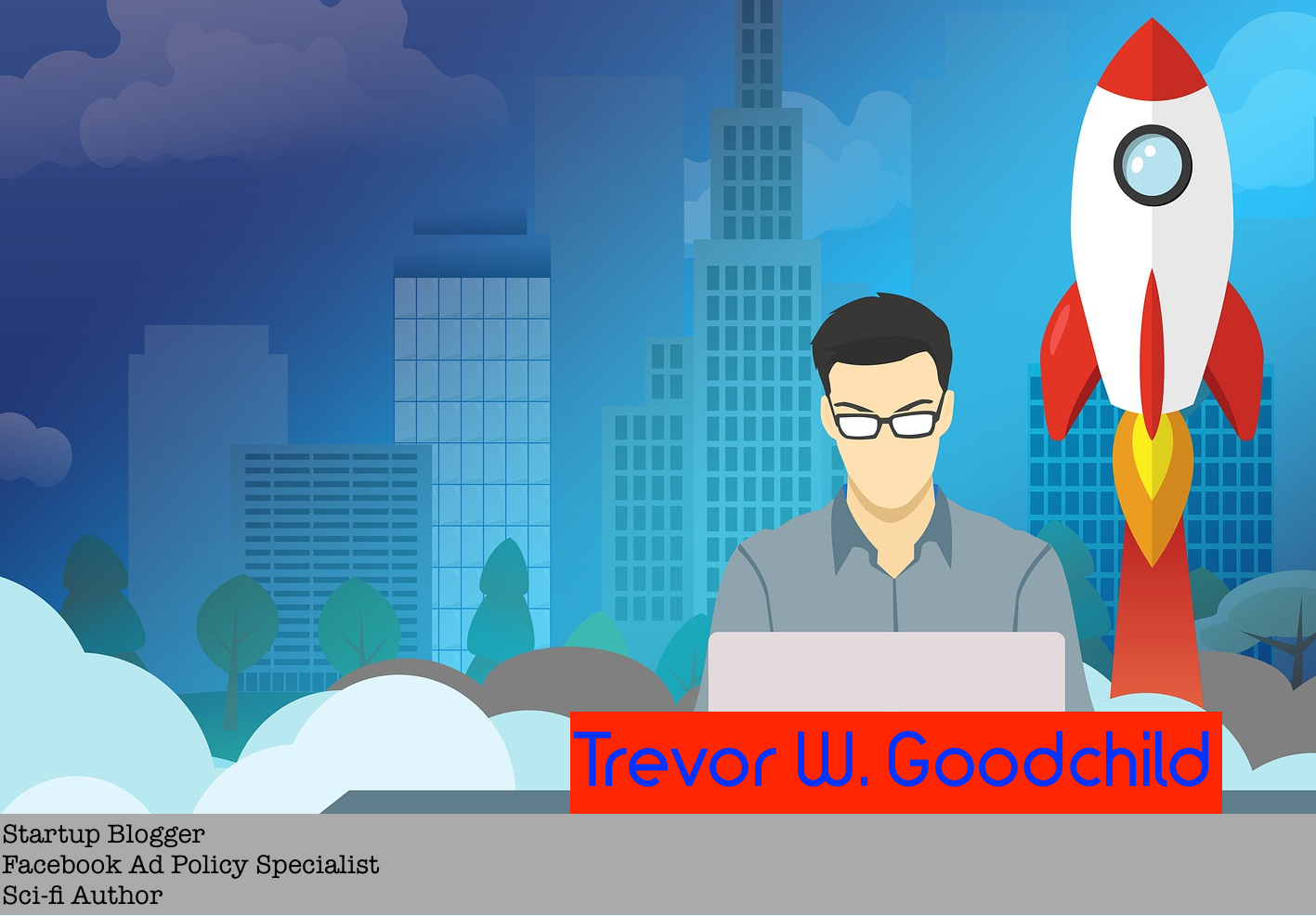





Leave a Reply
You must be logged in to post a comment.